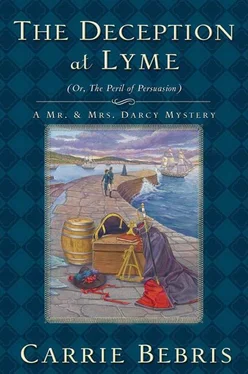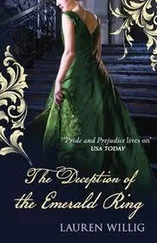A change of subject was in order. “Will you take a glass of wine with us, Lieutenant?” Darcy asked. “We would very much like to hear about your voyages with my cousin, if you would be so generous as to indulge us.”
Elizabeth, too, recognized the need to shift the mood. “Yes—please sit down.” She gestured toward an armchair. “We have been looking forward to this meeting.”
As Darcy signaled a footman to bring wine, Elizabeth and Georgiana settled on the sofa. Lieutenant St. Clair did not take the chair that Elizabeth had indicated, but one opposite it—a chair with no arms that could interfere with the sword hanging at his side. The seat also put the officer closer to Georgiana.
Georgiana cast off the melancholy that had temporarily claimed her and addressed Lieutenant St. Clair with the attentiveness due a guest. “You mentioned in your letter that you are recently returned from the West Indies,” she said. “Have you spent much time in that part of the world?”
“Most of my career.” St. Clair accepted a wineglass from the servant. “I first sailed there as a midshipman under Captain Croft—Admiral Croft, now—and returned many times. As you know, that was the destination of the Magna Carta, the ship on which I served with Lieutenant Fitzwilliam.”
“That was his first voyage across the Atlantic.” Darcy’s gaze strayed to the sea chest as he took the chair nearest it. The small trunk elicited in him feelings of both curiosity and sorrow. Gerard had died much too young, his naval career barely begun. The contents of the chest were all that remained of his service to the Royal Navy, and Lieutenant St. Clair, one of few people—the only one Darcy had personally met—who had known that side of him. “Were you well acquainted with my cousin?”
“Fairly well. As you might imagine, living for months in the confines of a ship rather restricts one’s society, and the higher an officer’s rank, the fewer his equals. The Magna Carta had a complement of nearly three hundred fifty, but of that number only a handful were commissioned officers. Lieutenant Fitzwilliam had just been made, and so was the most junior lieutenant. As first lieutenant, I took him under my wing, though he needed my guidance in few matters. By the time we left Jamaica on our return voyage, I relied upon him as confidently as I did the other lieutenants. More so, in some instances.”
“Why is that?” Elizabeth asked.
“He was quick-minded, brave but not foolhardy, loyal to the navy and proud to be serving His Majesty. He reminded me of myself not too many years earlier. Indeed, we had much in common—both younger sons making our own way in the world, and determined to make our fortunes in the process.”
Lieutenant St. Clair shared several stories of Gerard, tales that rekindled Darcy’s memories of his cousin’s integrity, intelligence, and good humor, while also casting him in new light. Darcy found it revealing to hear someone so close to him described by a stranger.
Darcy’s gaze drifted to Georgiana. But fifteen when she had last seen Gerard, she had been so proud of her older cousin—proud of his dedication to the service, his sense of honor and duty, the fine appearance he presented in navy blue. It was little wonder that shortly afterward she had fallen prey to the reprehensible George Wickham, another lifelong acquaintance who looked dashing in uniform. She had learned, nearly too late, that impeccable regimentals cannot dress up a scheming, selfish soul.
The conversation ebbed temporarily, one of those quiet pauses when new acquaintances are unsure where the discussion should next lead. It was Georgiana who broke the silence.
“We were told that Gerard died in action,” she said. “I have always wondered about the particulars.”
“He died bravely,” Lieutenant St. Clair said. “We were escorting two merchant ships back to England when we encountered a French frigate—the Dangereuse —traveling with a sloop of war. Her cannons crippled our rigging, but when her boarding party breached our deck, they found us rather disinclined to surrender. We forced them to retreat, but Lieutenant Fitzwilliam took a pistol ball during the melee.”
Darcy knew St. Clair was leaving much unsaid. War was a brutal business; Andrew St. Clair and Gerard Fitzwilliam had lived the violence merely summarized in the battle accounts published for public consumption in the Naval Chronicle. While Darcy appreciated the officer’s discretion—the horrors of battle were no subject for ladies’ ears—he himself longed to hear more. He had no taste for gore; rather, he wanted to fully understand his cousin’s final moments. For all of Darcy’s responsibilities, many of them settled upon him at an early age, his own life seemed sheltered and safe compared to Gerard’s and that of Colonel Fitzwilliam. Darcy had faced danger, but only when it came looking for him—he had not deliberately committed himself to a profession that actively sought it, as his two cousins had.
“Did Gerard suffer a great deal of pain?” Georgiana asked.
“I did not see him take the shot; I came upon him afterward. By that time he had lost consciousness. A seaman and I carried him down to the surgeon, but we had scarcely laid him on the table when he died.” He paused. “This may seem small consolation, Miss Darcy, but the final expression of his countenance was peaceful, so I believe he was insensible to pain at the end.”
“I was under the impression that my cousin’s request to you regarding his sea chest had been a deathbed wish,” Darcy said.
“No, he had asked me some time earlier, after we lost two of our midshipmen in another engagement, and a number of seamen to fever, all within a se’nnight. Ours is a hazardous profession, and we try not to dwell upon its risks, but the spectre of death does hover, and after a week of seeing dead crewmen’s belongings sold before the mast, the possibility of an untimely demise was much on everyone’s minds. An officer’s belongings, of course, are not subject to such an auction, but Lieutenant Fitzwilliam asked me, should he perish at sea, to personally convey his sea chest to his family were it within my power to do so, rather than leave it to be transported by unknown personnel with the rest of his effects. It was a promise I readily gave, and regret that duty prevented me from carrying through until now. I appreciate your meeting me here in Lyme, though I gladly would have traveled to Buckinghamshire to deliver the chest to the earl.”
It was just as well that Darcy’s travel plans had coincided with Lieutenant St. Clair’s arrival in Lyme, for the Earl of Southwell—Darcy’s eldest Fitzwilliam cousin—was not the most tactful individual, nor did he hold the navy in particularly high regard following his youngest brother’s death. His reaction upon receiving Gerard’s sword and other effects forwarded by the navy had been acrimonious; Darcy winced to think of what Southwell might have said to Lieutenant St. Clair upon receiving the chest in person.
“It is amazing to me that you have been so long from England,” Georgiana said. “Is it usual for a ship to be away for such an extended period, even during war?”
“I have served on numerous ships,” St. Clair said, “and been appointed to them at the will and convenience of the Admiralty. Some of the transfers occurred in foreign ports; on other occasions my new ship was leaving so soon upon the arrival of my former that there was no time for shore leave.”
“You must be grateful, then, to finally stand on English soil once more,” Elizabeth said.
“I am, indeed.” He set his wineglass on a side table. “Mr. and Mrs. Darcy, Miss Darcy—I appreciate your kind interest in my history, but no doubt you would much rather examine the accoutrements of Lieutenant Fitzwilliam’s career than politely endure an account of mine.”
Читать дальше












